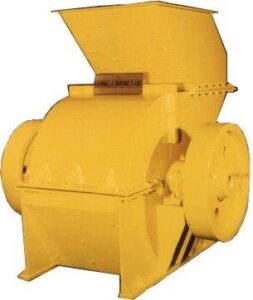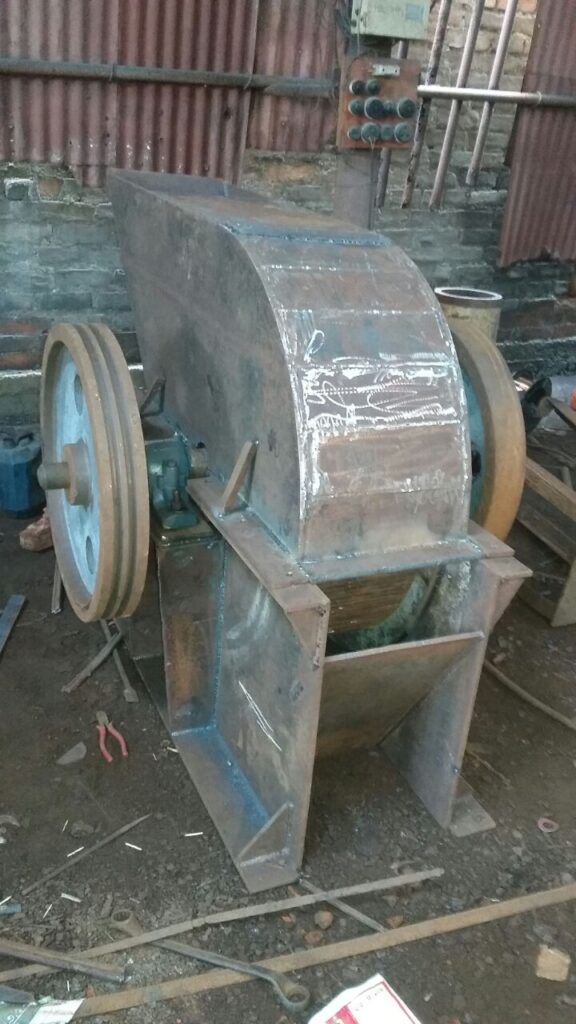
Hammer Crusher
Cut Costs and Boost Profits with HPPA
What is a Hammer Crusher?
Hammer crushers, also known as hammer mills, are machines used in the industry and construction to reduce the size of a material into smaller particles. They operate on the basic principle of impacting the material with hammers (usually metallic) that are mounted on a rotating shaft.
Specifications include:
- 2-stage and 3-stage
- Capacity : 20 TPH to 200 TPH
- Feed size : 300 mm and below
- Output size : 40 mm and below
- Price : INR 1.0 – 3.5 crore
- Power Source : Electricity or diesel generators
- Flexibility : Customized based on specific requirements
Different types of Hammer Crushers:
- Single Rotor Hammer Crusher: Contains a single rotor mounted on bearings.
- Double Rotor Hammer Crusher: Features two rotors that rotate in opposite directions.
- Reversible Hammer Crusher: Hammers can be reversed for wear distribution, extending the crusher’s service life.
- Ring Hammer Crusher: Consists of a series of hammers encased in a circular chamber.
- Heavy Hammer Crusher: Designed for high strength and efficiency, suitable for crushing hard materials.
Hammer Crusher Assembly Process
- Frame Assembly: The frame is the structural component that supports the entire crusher. It is usually made of steel and provides the foundation for the other components.
- Rotor Assembly: The rotor is the main rotating component of the hammer crusher. It consists of a shaft with several hammers attached to it. The hammers may be fixed or swinging freely on the rotor. The rotor assembly is mounted onto the frame with appropriate bearings.
- Hammers Installation: The hammers, which are responsible for crushing the material, are attached to the rotor. They are usually mounted using bolts or other fastening methods. The arrangement and configuration of the hammers may vary depending on the specific design of the crusher.
- Screen Installation: A screen is often placed at the bottom of the crusher to control the size of the crushed material. Screens can be interchangeable to achieve different particle sizes. The screen is installed in a way that allows the crushed material to pass through while retaining larger particles for further crushing.
- Drive System Installation: The drive system, which provides the power to rotate the rotor, is installed. This typically involves connecting the rotor shaft to a motor through a system of belts or gears.
- Feeding System Installation: If the crusher includes a feeding mechanism, it is installed to ensure a continuous and controlled supply of material into the crusher.
- Safety Features: Various safety features, such as guards and emergency stops, may be installed to ensure safe operation.
- Testing and Quality Control: The assembled crusher is thoroughly tested to ensure that all components are working correctly. This may involve running the crusher with a test material and checking for proper functioning of all parts.
Checklist for Choosing a Hammer Crusher:
- Material to be Crushed: Ensure the crusher is suitable for the material’s hardness, size, and moisture content.
- Capacity: Choose a crusher with the capacity to handle the expected production requirements.
- Rotor Design: Consider the rotor type (single, double, reversible) based on the specific application and desired output.
- Adjustability: Check if the crusher allows adjustments for different particle sizes.
- Wear Parts: Evaluate the availability and cost of wear parts, as they will need replacement over time.
- Maintenance Requirements: Consider the ease of maintenance and the availability of spare parts.
- Energy Efficiency: Look for crushers that offer high energy efficiency to reduce operating costs.
- Safety Features: Ensure the crusher has adequate safety features to protect operators during operation and maintenance.
- Installation Requirements: Consider space requirements and compatibility with existing systems.
- Cost: Compare initial costs, operating costs, and overall value for your specific application.
Why Choose HPPA Hammer Crusher?
- Durability and Wear Resistance:
- Problem: Traditional hammer crushers may suffer from quick wear and tear, leading to frequent replacements and downtime.
- HPPA Solution: Our Crushers are designed with advanced materials and engineering, providing enhanced durability and wear resistance. This ensures longer lifespan and reduces maintenance costs.
- Efficiency and Productivity:
- Problem: Inefficient crushing processes can result in lower productivity and increased energy consumption.
- HPPA Solution: Our Crushers are equipped with cutting-edge technologies that optimize the crushing process, leading to improved efficiency and higher productivity. This can result in cost savings over time.
- Versatility and Adaptability:
- Problem: Some hammer crushers may be limited in their adaptability to different types of materials and operating conditions.
- HPPA Solution: Our Crushers are designed to handle a wide range of materials and operating conditions, offering versatility and adaptability. This makes them suitable for various industries and applications.
- Safety Features:
- Problem: Safety concerns can arise from inadequate safety features in traditional hammer crushers.
- HPPA Solution: Our Crushers prioritize safety with advanced features such as automatic shutdown in case of anomalies, ergonomic designs, and enhanced operator protection. This contributes to a safer working environment.
- Environmental Impact:
- Problem: Environmental considerations are becoming increasingly important, and traditional crushers may not meet modern sustainability standards.
- HPPA Solution: Our crushers are designed with a focus on reducing environmental impact. They often incorporate energy-efficient technologies and may be equipped with features for dust suppression, noise reduction, and overall eco-friendly operation.

